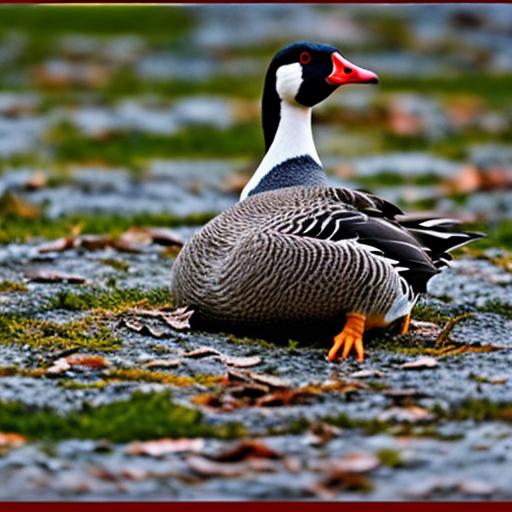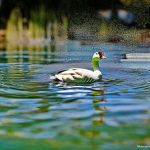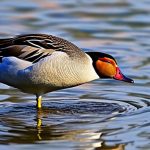The presence of geese in residential areas has become a growing problem in recent years. These birds can cause damage to property, create unsightly messes, and pose potential health risks. It is important to find humane solutions to geese control that will effectively manage the population while minimizing harm to the birds. By understanding the behavior of geese and implementing various methods, it is possible to create an environment that is less attractive to them and encourage them to relocate to more suitable habitats.
Key Takeaways
- Geese are social animals that prefer open spaces near water and grassy areas.
- Physical barriers like fences, netting, and spikes can prevent geese from accessing certain areas.
- Decoys like fake predators or other animals can trick geese into thinking an area is unsafe.
- Unappealing environments like tall grass, loud noises, and bright lights can discourage geese from staying in an area.
- Natural repellents like grape extract or citrus oils can be used to deter geese without harming them.
Understanding the behavior of geese
Geese are attracted to certain areas for several reasons. One of the main factors is the availability of food sources. Residential areas often provide ample food for geese, such as grassy lawns and agricultural fields. Additionally, geese are social animals and tend to congregate in areas where they feel safe and can find suitable nesting sites. Understanding these behaviors can help in developing effective strategies for geese control.
Geese are highly social animals and live in flocks. They have a strong sense of community and will often return to the same nesting sites year after year. This social behavior can make it difficult to deter geese from an area once they have established it as their habitat. They are also highly protective of their nests and will aggressively defend them if they feel threatened. This behavior can pose a challenge when trying to implement humane methods of geese control.
Installing physical barriers to deter geese
One effective method of geese control is the installation of physical barriers such as fences and netting. These barriers can prevent geese from accessing certain areas, such as lawns or ponds, where they may cause damage or create messes. Fences should be at least three feet high and made of materials that are difficult for geese to climb or fly over. Netting can be used to cover ponds or other water features to prevent geese from landing or swimming in them.
When installing physical barriers, it is important to ensure that they are properly installed and maintained. Fences should be securely anchored to the ground and checked regularly for any damage or gaps that may allow geese to pass through. Netting should be tightly secured and regularly inspected for any tears or holes. It is also important to regularly trim any vegetation near the barriers that geese may use as a perch to gain access.
Using decoys to keep geese away
Decoys can be an effective method of geese control by tricking the birds into thinking an area is unsafe. Decoys can be in the form of plastic or wooden replicas of predators such as coyotes or owls. These decoys should be strategically placed in areas where geese are known to congregate, such as near ponds or on lawns. The presence of these decoys can create a sense of danger for the geese and discourage them from staying in the area.
There are several examples of effective decoys that have been used for geese control. One example is the use of a motion-activated sprinkler system. When a goose approaches the area, the sprinkler system is triggered and sprays water, scaring the bird away. Another example is the use of reflective tape or balloons that move with the wind. The movement and reflection of light can create a sense of danger for geese and deter them from landing or staying in an area.
Creating an unappealing environment for geese
Making an area less attractive to geese can be an effective method of geese control. This can be done by removing food sources and water features that may attract geese. For example, keeping grassy lawns short and free of weeds can make them less appealing to geese as a food source. Additionally, removing any standing water or puddles can discourage geese from landing or swimming in an area.
Maintaining an unappealing environment for geese requires regular maintenance and upkeep. This includes regularly removing any fallen fruit or berries from trees or shrubs, as these can be a food source for geese. It is also important to regularly clean up any messes left by geese, such as droppings or feathers. This will help to discourage geese from returning to the area and establish it as an unattractive habitat.
Employing natural repellents to keep geese at bay

Natural repellents can be an effective method of geese control by creating an unpleasant environment for the birds. One example of a natural repellent is predator urine, which can be purchased from garden supply stores. The scent of predator urine can deter geese from landing or staying in an area. Another example is garlic spray, which can be made by mixing garlic cloves with water and spraying it on grassy areas or around ponds.
When using natural repellents, it is important to follow the instructions carefully and use them in a safe and responsible manner. Some natural repellents may need to be reapplied regularly, especially after rainfall. It is also important to consider the potential impact on other wildlife or pets in the area when using natural repellents.
Encouraging geese to relocate to a more suitable habitat
Encouraging geese to relocate to a more suitable habitat is an important aspect of geese control. This can be done by creating alternative habitats that are more attractive to geese and providing them with suitable nesting sites. For example, creating a designated nesting area with tall grasses and shrubs can provide geese with a safe and suitable place to nest.
Another way to encourage geese to relocate is by making their current habitat less appealing. This can be done by removing any food sources or water features that may attract geese. Additionally, implementing methods such as physical barriers or natural repellents can create an environment that is less attractive to geese and encourage them to seek out more suitable habitats.
Implementing humane methods for geese control
It is important to find humane solutions to geese control that minimize harm to the birds. One example of a humane method is egg addling, which involves shaking or coating goose eggs with oil to prevent them from hatching. This method is effective in reducing the population of geese without causing harm to the birds. Another example is habitat modification, which involves altering the environment in a way that makes it less suitable for geese, such as removing nesting sites or food sources.
By implementing humane methods for geese control, it is possible to effectively manage the population while minimizing harm to the birds. This approach is not only more ethical, but also more sustainable in the long term.
Educating neighbors about the importance of geese management
Educating neighbors about the importance of geese management is crucial in achieving effective geese control. Many people may not be aware of the potential damage and health risks associated with geese in residential areas. By educating neighbors about these issues, it is possible to gain their support and cooperation in implementing geese control measures.
One way to educate neighbors is by organizing community meetings or workshops where experts can provide information and answer questions about geese management. It is also important to provide educational materials such as brochures or flyers that explain the importance of geese control and provide tips on how to properly implement various methods.
Seeking professional assistance for geese removal
In some cases, it may be necessary to seek professional assistance for geese removal. Professional wildlife control companies have the knowledge and experience to effectively manage geese populations while ensuring the safety and well-being of the birds. They can provide expert advice on the most appropriate methods for geese control and help implement these methods in a safe and responsible manner.
When seeking professional assistance, it is important to find a reputable company that specializes in geese control. This can be done by researching online, asking for recommendations from neighbors or local authorities, and checking for certifications or licenses. It is also important to ask for references and inquire about the methods and techniques used by the company.
Maintaining a consistent geese control routine
Maintaining a consistent geese control routine is essential in effectively managing the population and preventing geese from returning to an area. Geese are persistent animals and will continue to return to an area if they find it attractive or suitable for nesting. By regularly implementing geese control measures, it is possible to establish an environment that is less appealing to geese and discourage them from staying in the area.
Regular maintenance and upkeep of physical barriers, natural repellents, and other geese control methods is crucial in maintaining their effectiveness. This includes regularly inspecting fences and netting for any damage or gaps, reapplying natural repellents as needed, and removing any fallen fruit or berries that may attract geese. It is also important to regularly clean up any messes left by geese, such as droppings or feathers.
In conclusion, finding humane solutions to geese control is important in effectively managing the population while minimizing harm to the birds. By understanding the behavior of geese and implementing various methods such as physical barriers, decoys, natural repellents, and habitat modification, it is possible to create an environment that is less attractive to geese and encourage them to relocate to more suitable habitats. Educating neighbors about the importance of geese management, seeking professional assistance when necessary, and maintaining a consistent geese control routine are also crucial in achieving effective results. By taking action in managing geese in residential areas, we can create a safer and more enjoyable environment for both humans and wildlife.
If you’re looking for more information on keeping geese out of your yard, you might also be interested in learning about the importance of a well-designed chicken coop. A properly constructed chicken coop not only provides a safe and comfortable environment for your feathered friends but also helps to keep them contained and protected from predators. Check out this informative article on “10 Essential Features of a Chicken Coop” at poultrywizard.com to ensure that your coop meets all the necessary requirements.
FAQs
What are some common reasons for wanting to keep geese out of your yard?
Geese can cause damage to lawns, gardens, and landscaping. They can also leave behind droppings that are unsightly and can carry diseases.
What are some effective ways to keep geese out of your yard?
Some effective ways to keep geese out of your yard include using physical barriers such as fences or netting, using decoys or scare tactics, and removing food sources that may attract geese.
What are some natural deterrents for geese?
Some natural deterrents for geese include planting certain types of vegetation that geese do not like, using reflective surfaces such as mirrors or CDs to scare them away, and using dogs or other animals that geese are afraid of.
Is it legal to harm or kill geese to keep them out of your yard?
No, it is not legal to harm or kill geese unless you have a permit from the appropriate authorities. There are humane ways to deter geese from your yard without causing harm to them.
What should I do if I have a persistent geese problem?
If you have a persistent geese problem, you may want to consider contacting a professional wildlife control service. They can assess the situation and provide effective solutions for keeping geese out of your yard.
Meet Walter, the feathered-friend fanatic of Florida! Nestled in the sunshine state, Walter struts through life with his feathered companions, clucking his way to happiness. With a coop that’s fancier than a five-star hotel, he’s the Don Juan of the chicken world. When he’s not teaching his hens to do the cha-cha, you’ll find him in a heated debate with his prized rooster, Sir Clucks-a-Lot. Walter’s poultry passion is no yolk; he’s the sunny-side-up guy you never knew you needed in your flock of friends!







